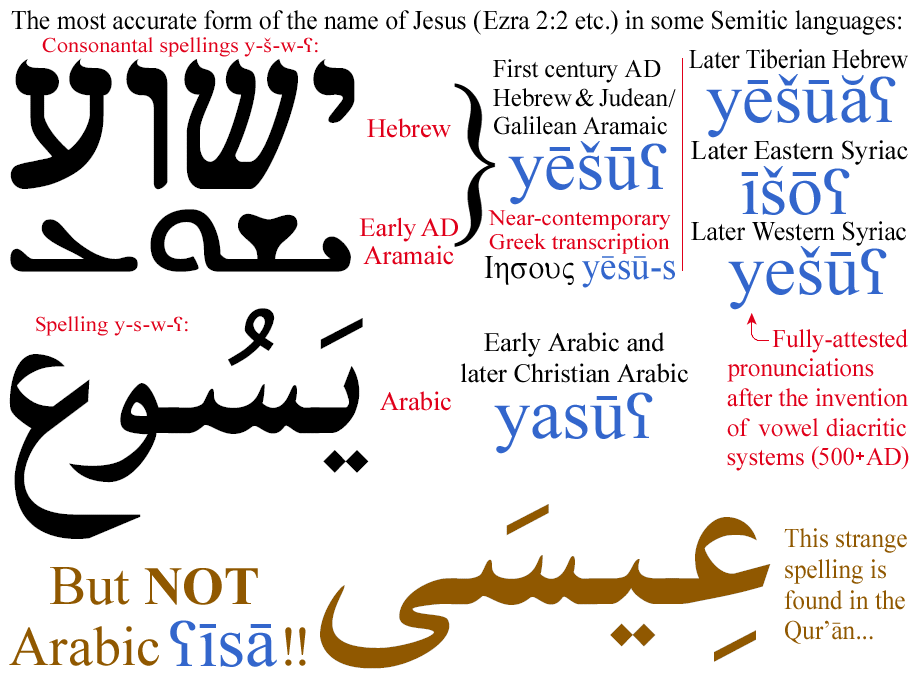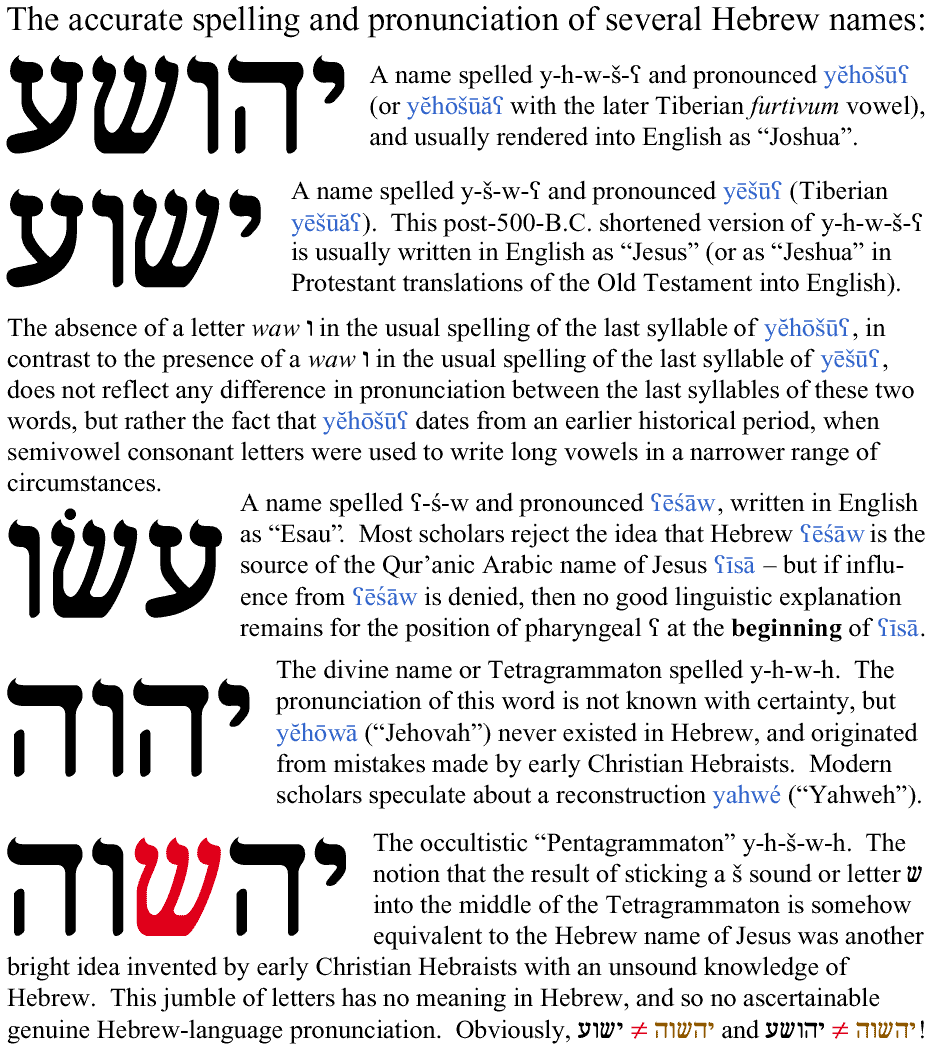The most accurate form of the name of Jesus in several Semitic languages
In the earliest or most authentic forms of the name of Jesus, the voiced pharyngeal `Ayn or `Ayin consonant is always at the end of the name (and not at the beginning, as it is in the form `Isa used by Muhammad in the Qur'an). The scientific linguistic reconstruction of the original 1st. century A.D. pronunciation of the name of Jesus in the Hebrew language and the Judean and/or Galilean Western Aramaic languages is supported by a number of lines of evidence, some of which are shown in the diagram below. In this graphic, phonemic/phonetic transcriptions are in blue, the `Ayn sound is transcribed with its proper phonetic symbol (which looks somewhat like a reversed question mark), and long vowels are indicated by macrons over vowel letters. (Due to the technical limitations of some browsers, in the HTML text of this page, `Ayn is shown with a left single apostrophe mark ` and long vowels are indicated by circumflex diacritics.) Syriac vowel lengths are shown according to the convention that a yod or waw letter used as a mater indicates a historically-long vowel (though most length contrasts seem to have disappeared by the time of the liturgical vowel-diacritic orthographies). For some context on the theological/controversialist aspect of all this, look at the full version of the Arabic-language "Shield of the Trinity" graphic on the Symbolic Truth site main page (or view the three pages of this small PDF file, which contains resizable vector versions of the two large images below).

So in terms of Unicode, ישוע = ܝܫܘܥ = يسوع (yēšūʕ, yasūʕ) but not عيسى (ʕīsā)!
The name y-sh-w-` ישוע (Jesus/Jeshua) -- which was reconstructed above as having the 1st. century A.D. Hebrew and Western Aramaic pronunciation Yêshû` -- occurs in the Hebrew of the Old Testament at Ezra 2:2, 2:6, 2:36, 2:40, 3:2, 3:8, 3:9, 3:10, 3:18, 4:3, 8:33; Nehemiah 3:19, 7:7, 7:11, 7:39, 7:43, 8:7, 8:17, 9:4, 9:5, 11:26, 12:1, 12:7, 12:8, 12:10, 12:24, 12:26; 1 Chronicles 24:11; and 2 Chronicles 31:15, and also in Aramaic at Ezra 5:2.
In Nehemiah 8:17 this name refers to Joshua son of Nun, the successor of Moses, since ancient Hebrew Yêshû` ישוע was a shorter post-Exilic version of the name Yehôshû` יהושע or "Joshua". For this reason, Joshua son of Nun appears as Ιησους (Iêsous or "Jesus") in the ancient Greek of Josephus and the New Testament (Acts 7:45, Hebrews 4:8), etc.
For more information on the Hebrew names, see the large image below on this page.
Note that the ancient Greek spelling Iota-eta-sigma-omicron-upsilon-sigma (Ιησους) was actually the closest possible adaptation or borrowing of the ancient Hebrew/Aramaic name Yêshû` (yod-shin-waw-`ayin) into Greek which the rules of the sound-system and morphology of Greek would allow:
The ancient Greek language did not have any voiced pharyngeal `Ayin consonant or palatal sibilant [š] ("sh") sound, and insofar as a [y] consonant sound existed, it was phonologically just a variant of the [i] vowel. So there were simply no Greek letters for `Ayin, "sh", or "y". And in late Hellenistic Greek, omicron-ypsilon was pronounced as a simple long [u] vowel (the [u] in Yêshû` is also long). And finally, if a noun or name was to be "declined" in Greek (i.e. have distinct forms for at least some of the nominative, genitive, dative, accusative, and vocative morphological cases), then it needed to have appropriate Greek grammatical endings added on at the end (see the table of case inflections below) -- and almost half the non-neuter nouns in the Greek language had an "s" ending in the nominative singular. So Iêsous [yêsûs] is the nearest that ancient Greek could get to Hebrew and/or Aramaic Yêshû` while obeying the rules of ancient Greek grammar.
By contrast, Arabic `Îsâ عيسى (`Ayn-ya-sin-ya or `Ayn-ya-sin-alif maqsurah) is NOT the closest rendition into the Arabic language of original Hebrew/Aramaic Yêshû` , since Arabic Yasû` يسوع (Ya-sin-waw-`ayn, with the voiced pharyngeal `Ayin or `Ayn consonant in its proper position at the end of the name) is obviously much closer. From this point of view, Greek Iêsous is a much less corrupt and distorted form than Arabic `Îsâ!! (Note that the rendering of [š] into [s] seen in both Yasû` and `Îsâ is a common correspondence seen in early borrowings from Hebrew or Aramaic into Arabic.)
Finally, during the late 16th century and early 17th century, Protestant English Bible translators went through the standard Vulgate Latin translation of the Old Testament then used in the west, comparing it in detail to the Hebrew-language Bible preserved by Jews. As part of this process, the traditional English-language versions of the names of many Biblical figures were changed to more closely conform with the original Hebrew-language forms of their names. So "Noe" was changed to "Noah", "Isaias" became "Isaiah", etc. etc. But the English versions of the names of some major Biblical figures -- such as Jesus and Solomon -- were not changed. This is why, from that time on, the same name (Hebrew Yêshu` ישוע / Greek Iêsous Ιησους) became "Jeshua" in English translations of the Old Testament, but remained "Jesus" in English translations of the New Testament -- introducing a minor inconsistency into the English transcriptions of this name in different parts of the Bible.
Non-Muslim crackpottery about the name of Jesus
For some reason, the myths below sometimes come up in discussions about whether the name of Jesus originally had a voiced pharyngeal `Ayin/`Ayn consonant at the end or at the beginning -- even though these theories are held by small non-traditional Christian groupings, whose quasi-eccentric doctrines do not come close to those of Islam, and are not accepted by mainstream linguists and scholars of ancient languages:
The Hebrew name of Jesus is NOT derived by adding a "sh" sound or Hebrew letter shin to the Tetragrammaton (four-letter Hebrew name of God) YHWH.
While the older longer form of Yêshû` (Yehôshû`) contained a partial contracted form of the Tetragrammaton at the beginning, the main part of this name is probably derived from Hebrew root Yod-shin-`ayin or Waw-shin-`ayin -- and it is extremely obvious that the name Yêshû` doesn't contain any [h] sound, but does contain a a voiced pharyngeal `Ayin consonant, while the Tetragrammaton YHWH doesn't have any `Ayin ע. Therefore, all such spellings as "Yahshuah"[sic!] are completely incorrect and utterly bogus! For a further explanation using Hebrew letters and proper phonetic symbols, see the large image below on this page.
Note that it was the late 16th-century or early 17th-century occultists of the Clavicula Salomonis and the Calendarium Naturale Magicum Perpetuum who first came up with the (simply factually incorrect) idea that the name of Jesus was the Tetragrammaton plus "Sh" ש, and that this mystic pentagram or "pentagrammaton" was funneled into modern occultism by 19th-century French author Eliphas Levi before finally being taken up by quasi-fringe Christian religious grouplets in recent years -- see this link, or this image linked from this page, or the entry for "Pentagrammaton" in this glossary of the influential late 19th-century "Golden Dawn" occult society.
The modern English name "Jesus" is derived from ancient Greek Iêsous by a path of linguistic development which is extremely typical and completely ordinary for items of Classical vocabulary: It was borrowed from Greek into Latin, from Latin into early medieval Old French, from medieval French into medieval Middle English, and then developed within the English language from medieval times into modern times -- with all the accompanying appropriate sound changes normal to each stage of this evolution. So modern English "Jesus" derives from original Hebrew/Aramaic Yêshû` by means of a sequence of closest possible adaptations when borrowing the name from one language to another, and by normal linguistic changes over time -- and therefore it is not the result of any artificial manipulations or unnatural alterations.
(There have also been variant forms of the name of Jesus during some periods of the history of the English language, such as "Jesu", borrowed from the Old French oblique case form and/or the Latin vocative case form -- and of course, the consistent visual differentiation of I/J and of U/V in writing didn't really begin until the 17th century.)
Here's a table of the noun case declension of the name Jesus in both Latin and ancient Greek. For Latin, both a typical modern spelling and the ancient Roman empire spelling (before the invention of the upper case / lower case contrast or the separation of I/J and U/V into distinct letters) are shown. For Greek, both a transcription and the original Greek alphabet spelling (also from before the invention of an upper case / lower case distinction) are shown. Of course, the "lunate" or C-shaped form of the Greek letter sigma was often used (e.g. IHCOYC etc.).
| Case: | Latin: | Greek: |
|---|---|---|
| Nominative | Jesus (IESVS) | Iêsous (ΙΗΣΟΥΣ) |
| Accusative | Jesum (IESVM) | Iêsoun (ΙΗΣΟΥΝ) |
| Genitive / Dative (Latin also Ablative) | Jesu (IESV) | Iêsou (ΙΗΣΟΥ) |
| Vocative | Jesu (IESV) | Iêsou (ΙΗΣΟΥ) |
The accurate spelling

